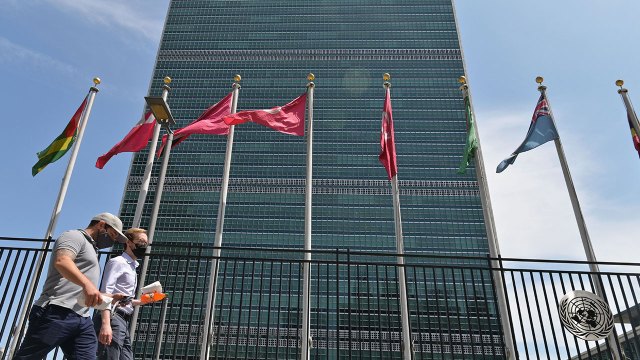
As the 79th United Nations General Assembly opens on Sept. 10, people around the world generally see the UN in a positive light. A median of 58% across 35 countries have a favorable view of the organization, while 31% have a negative view, according to a Pew Research Center survey conducted this spring.
This Pew Research Center analysis explores public opinion of the United Nations. We surveyed people in 35 countries across the Asia-Pacific region, Europe, Latin America, the Middle East, North America and sub-Saharan Africa.
For non-U.S. data, we conducted nationally representative surveys of 40,566 adults from Jan. 5 to May 21, 2024. All surveys were conducted over the phone with adults in Canada, France, Germany, Greece, Italy, Japan, Malaysia, the Netherlands, Singapore, South Korea, Spain, Sweden and the United Kingdom. Surveys were conducted face-to-face in Argentina, Bangladesh, Brazil, Chile, Colombia, Ghana, Hungary, India, Israel, Kenya, Mexico, Nigeria, Peru, the Philippines, Poland, South Africa, Sri Lanka, Thailand, Tunisia and Turkey. In Australia, we used a mixed-mode probability-based online panel.
In the United States, we surveyed 3,600 U.S. adults from April 1 to 7, 2024. Everyone who took part in this survey is a member of the Center’s American Trends Panel (ATP), an online survey panel that is recruited through national, random sampling of residential addresses. This way nearly all U.S. adults have a chance of selection. The survey is weighted to be representative of the U.S. adult population by gender, race, ethnicity, partisan affiliation, education and other categories. Read more about the ATP’s methodology.
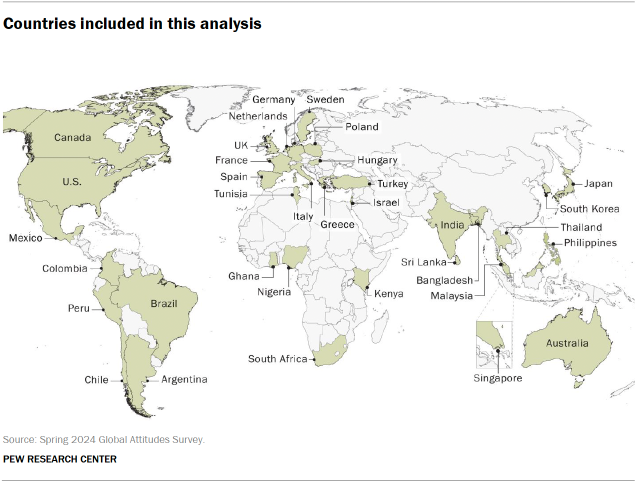
Throughout this analysis, we look at respondents’ attitudes based on where they place themselves on an ideological scale. We asked about political ideology using several slightly different scales and categorized people as being on the ideological left, center or right.
- In most countries, we asked people to place themselves on a scale ranging from “Extreme left” to “Extreme right.” The question was asked this way in Argentina, Bangladesh, Brazil, Canada, Chile, Colombia, France, Germany, Greece, Hungary, Israel, Italy, Mexico, the Netherlands, Nigeria, Peru, the Philippines, Poland, South Africa, Spain, Sweden, Turkey and the United Kingdom.
- In Australia, the scale ranged from “Left” to “Right.”
- In Japan, Singapore, South Korea and Thailand, we used a scale from “Extremely progressive” to “Extremely conservative.”
- In the U.S., ideology is defined as conservative (right), moderate (center) and liberal (left).
- We did not ask about ideology in Ghana, India, Kenya, Malaysia, Sri Lanka or Tunisia.
To compare educational groups across countries, we standardized education levels based on the UN’s International Standard Classification of Education (ISCED).
Prior to 2024, combined totals were based on rounded topline figures. Beginning in 2024, totals are based on unrounded topline figures, so combined totals might be different than in previous years. Refer to the 2024 topline to find our new rounding procedures applied to past years’ data.
Here are the questions and responses used for the analysis, the survey methodology for non-U.S. surveys, and the survey methodology for the U.S. survey.
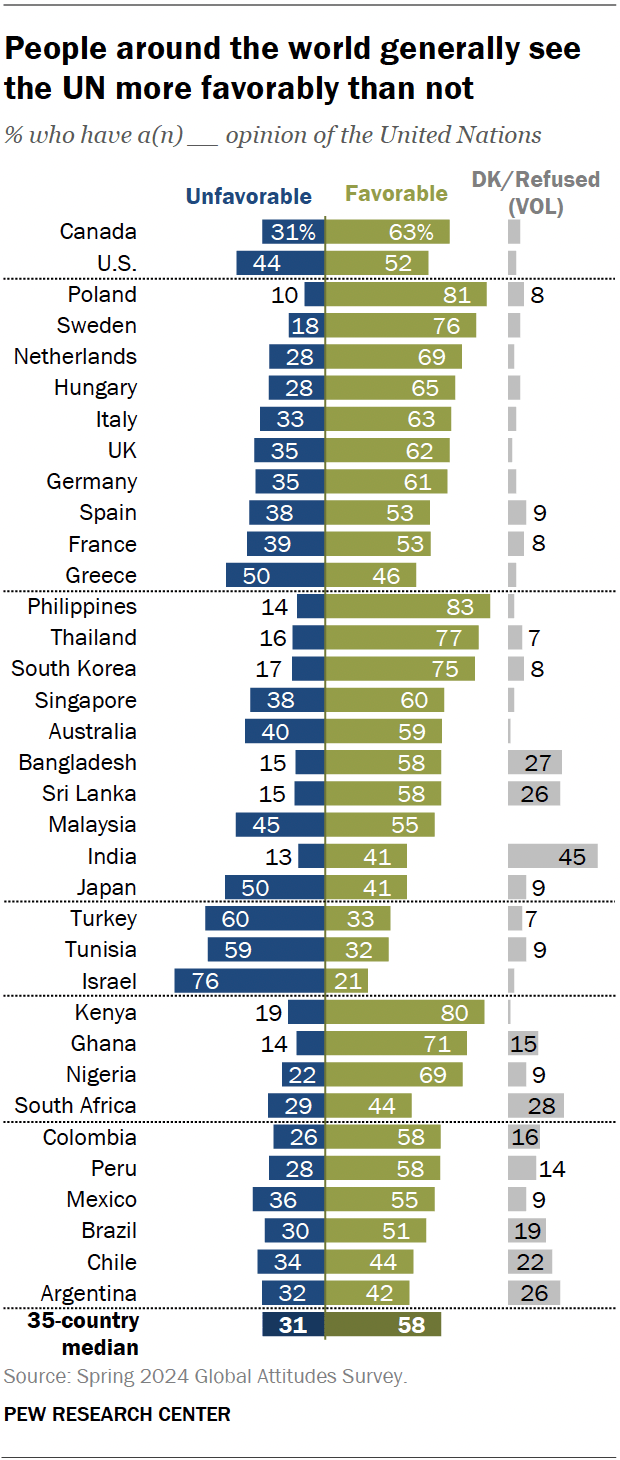
In 22 of the 35 countries surveyed, majorities see the UN positively. This includes three-quarters or more in Kenya, the Philippines, Poland, South Korea, Sweden and Thailand.
Views of the UN are less positive in some places. Half or more in Greece, Israel, Japan, Tunisia and Turkey express a negative opinion.
Israelis have long had more negative than positive views of the UN. This year, their views are the most negative of the countries polled: 76% there view the organization unfavorably. Jewish Israelis (82%) have more negative views of the UN than do Arab Israelis (53%).
How opinions of the UN have changed over time
Favorable views of the UN have dipped in many places over the past year. In Israel, favorable views fell from 31% – which was already relatively low – to 21% over the past year.
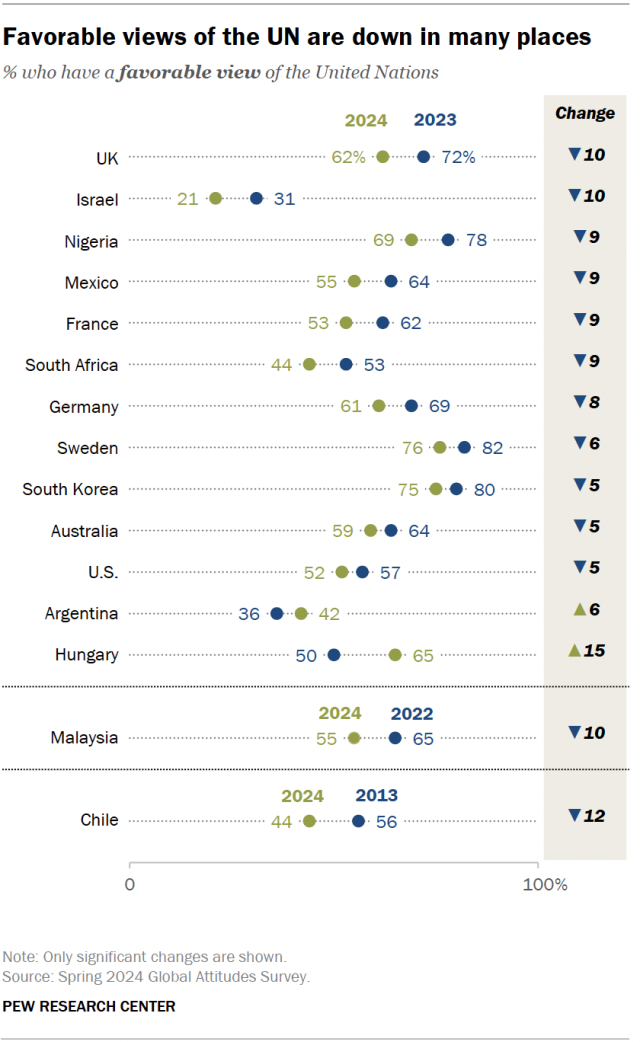
Similarly, 62% of Britons now see the UN favorably, down from 72% last year. Positive ratings of the UN are also down in Australia, France, Germany, Mexico, Nigeria, South Africa, South Korea and Sweden.
Americans’ views of the UN have turned more negative over the past year as well. Today, 52% of U.S. adults see the UN in a positive light, down 5 percentage points from 2023. Additionally, only 31% see strengthening the UN as a top foreign policy priority.
Related: Fewer Americans view the United Nations favorably than in 2023
In other countries, opinions of the UN have declined over a longer period. For example, the share of people in Malaysia who have a favorable opinion of the UN has decreased 10 points since 2022, and the share in Chile is down 12 points since 2013.
Only in Argentina and Hungary have views become more positive since last year (up 6 points and 15 points, respectively).
How opinions of the UN vary within countries
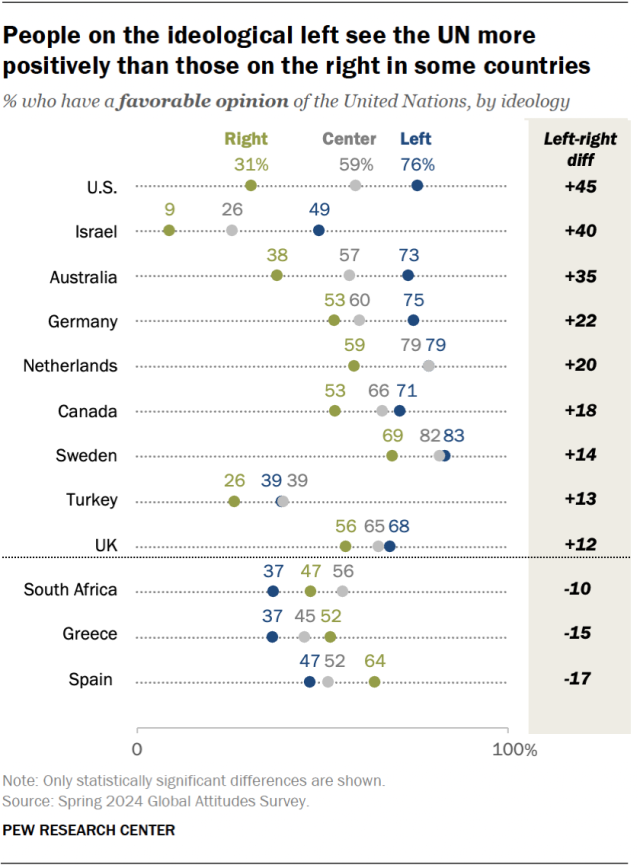
As has been the case in a handful of countries in past years, people on the ideological left are more likely than those on the right to express a positive opinion of the UN.
The ideological divide is largest in the U.S. and Israel, where those on the left are at least 40 points more favorable toward the UN than those on the right. Adults on the ideological left also have more favorable views than those on the right in Australia, Canada, Germany, Netherlands, Sweden, Turkey and the UK.
However, people on the ideological right are more likely to express a favorable opinion in South Africa, Greece and Spain. Notably, Greeks on the right are also more favorable than those on the left toward NATO and the EU.
In some countries, ideological views of the UN have shifted over time. For example, French adults on the ideological right have grown much less positive toward the UN since 2023 (down 18 points) than those on the left (-5) or in the center (-4) have. Among Swedes, too, those on the right have grown significantly less favorable toward the UN (-10) than others on the ideological spectrum have. Meanwhile, Hungarians on the right (+20) and in the center (+16) have grown more favorable of the UN, compared with those on the left.
In 24 of the 35 countries surveyed, younger adults are more likely than older adults to have a positive opinion of the UN. The age divide is largest in Malaysia: 66% of adults ages 18 to 34 see the UN favorably there, compared with 43% of those 50 and older.
Education also relates to views of the UN in some countries. For example, Germans with higher levels of education are more likely than their counterparts with less education to hold a favorable opinion of the UN (75% vs. 56%). In many of these countries, however, those with less education are also less likely to provide a response.
Note: This is an update of a post first published Sept. 17, 2021. Here are the questions and responses used for the analysis, the survey methodology for non-U.S. surveys, and the survey methodology for the U.S. survey.
